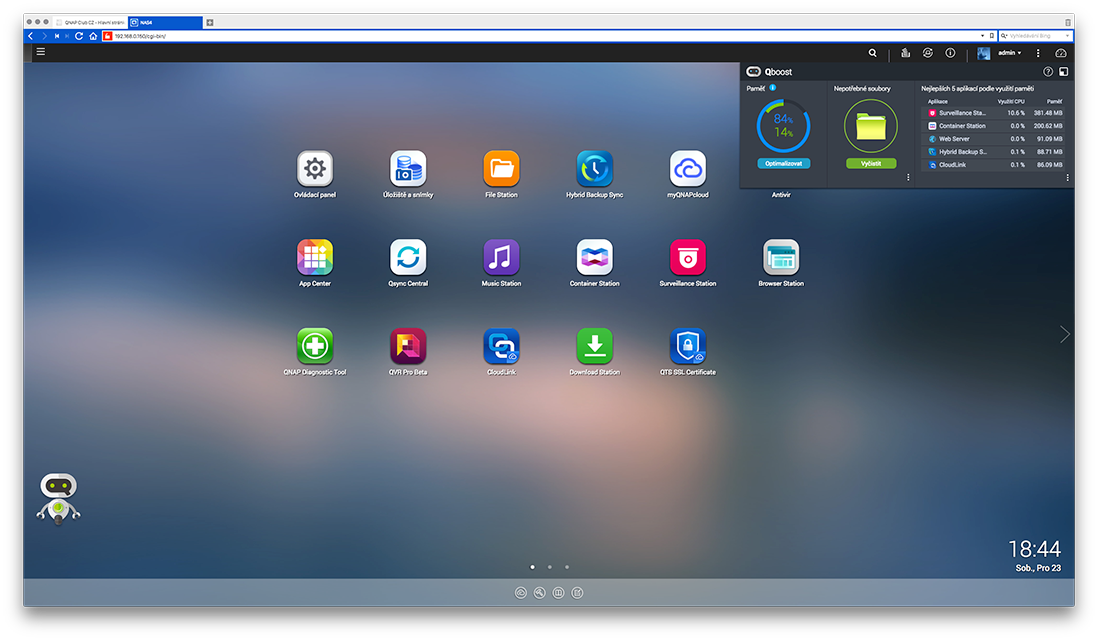QTS 4.3.4.0597 build 20180528 [finální verze]
Napsal: 23 kvě 2018, 09:08

Na světě je nový firmware ve verzi: "4.3.4.0597".
Stažení poslední verze firmware QTS je nyní možné jako vždy v sekci "Centrum stahování", anebo v menu QNAP NAS dle návrhu automatické detekce nového FW (Live update bude k dispozici zítra).
Změny:
Important Notes
- This QTS update changes the file system of the system partition to ext4 for ARM-based models with Annapurna Labs processors. For data security reasons, you are not able to downgrade QTS to a previous version after this update.
Affected models: TS-131P, TS-231P, TS-431P, TS-531P, TS-231+, TS-431+, TS-231P2, TS-431P2, TS-431X, TS-431X2, TS-531X, TS-831X, TS-1231XU-RP, TS-1231XU, TS-831XU-RP, TS-831XU, TS-431XU-RP, TS-431XU, TS-431XeU, and TS-1635.
- To ensure system stability, QNAP recommends updating and then restarting QVPN Service in App Center after you update QTS to 4.3.4.
- As QTS previous versions of ARM models do not support snapshots, when you upgrade to QTS 4.3.4, the original volume cannot use this feature immediately. To solve this problem, you have to back up the existing data on your QNAP NAS to external storage. Then you can rebuild the QNAP NAS and take snapshots to the new storage pool with multiple volumes.
- QTS 4.3.4 is the final available firmware update for the following models:
TS-EC1679U-SAS-RP, TS-EC1679U-RP, TS-1679U-RP, TS-EC1279U-SAS-RP, TS-EC1279U-RP, TS-1279U-RP, TS-1079 Pro, TS-EC879U-RP, TS-879U-RP, TS-1270U-RP, TS-870U-RP, TS-470U-RP, TS-470U-SP, TS-1269U-RP, TS-869U-RP, TS-469U-RP, TS-469U-SP, TS-879 Pro, TVS-870, TS-870 Pro, TS-870, TVS-670, TS-670 Pro, TS-670, TVS-470, TS-470 Pro, TS-470, TS-869 Pro, TS-869L, TS-669 Pro, TS-669L, TS-569 Pro, TS-569L, TS-469 Pro, TS-469L, TS-269 Pro, TS-269L, IS-400 Pro.
- For the status of QTS updates and maintenance for your NAS model, visit https://www.qnap.com/en/product/eol.php
- When QTS 4.3.x is installed on NAS models running on 64-bit Intel and AMD processors, some applications may not be supported. To check if installed apps on your NAS are compatible with QTS 4.3.x, download the QTS 64-bit compatibility tool and install it on your current QTS build. (https://download.qnap.com/QPKG/CF64_0.1-1114.qpkg.zip)
- Starting from QTS 4.3.4, QNAP NAS devices no longer support creating storage pools or static volumes using NVMe PCIe/M.2 SSDs. However, this limitation does not apply to the SSDs installed in built-in M.2 slots or on QM2 expansion cards.
- Below are the kernel versions for the NAS models supported by QTS 4.3.4.0479:
kernel 3.10.20: TS-128, TS-228
kernel 3.2.26: TS-x31, TS-x31U
kernel 3.4.6: TS-x69, TS-x69U, TS-x69L
kernel 4.2.8: HS-251, IS-400, SS-x79U, TS-x79, TS-x79U, SS-x79U, TS-x70, TS-x70U, TVS-x70, TS-x31P, TS-x31P2, TS-x31+, TS-x31X, TS-x31XU, TS-x28A, TS- x35, TS-x51, TS-x51A, TS-x51U, TS-x53, TS-x53A, TBS-x53A, TS-x53B, TS-x53BU, TS-x53S, IS-453S, TS-x53U, TVS-x63, TS-x63, TS-x63U, TS-x73U, TS-x77, TVS-x80, TS-x80, TVS-x80U, TS-x80U, TVS-x82, TVS-x82S, TVS-1582TU, TS-x85, TES-x85U, TDS-16489U, TVS-x71, TVS-x71U, TVS-x73
Fixed Issues
- Users could not close the privacy policy announcement when accessing QTS under certain circumstances.
- Users could not connect to the NAS after syncing the files in two shared folders with two client devices via Qsync.
- Files and subfolders in encrypted shared folders would sometimes disappear after a data migration.
- Users could not back up iSCSI LUNs to the shared folders on devices running Windows 10 Pro.
- Users could not access the NAS from Windows if the Samba configuration file was corrupted.
- QTS System Logs could not display connection logs for FTP connections.
- Users could not specify passwords that contained a large number of special characters.
- QTS would automatically create a virtual switch after users restarted the NAS.
- Control Panel could only list up to 1000 domain computers.
- Users could not back up NAS shared folders using scheduled backup on Windows Server 2012 R2.
- Certain folders deleted via SMB would be recovered automatically.
- QTS would automatically translate certain folder names after users changed the system language.